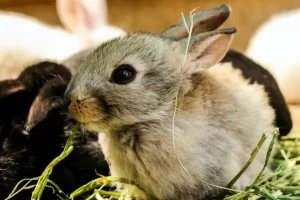Are rabbits wreaking havoc on your tulips? Don’t let those furry pests ruin your garden oasis.
In this article, we’ll show you how to protect your precious tulips from those pesky nibblers. From understanding rabbit behavior to building a rabbit-proof fence, we’ve got you covered.
Discover natural deterrents, companion plants that repel rabbits, and long-term strategies for effective rabbit control.
Say goodbye to rabbit damage and hello to flourishing tulips with these helpful tips and tricks.
In This Article
- 1 Key Takeaways
- 2 Understanding Rabbit Behavior
- 3 Identifying Rabbit Damage on Tulips
- 4 Natural Ways to Deter Rabbits From Tulips
- 5 Building a Rabbit-Proof Fence
- 6 Using Repellents to Protect Tulips
- 7 Companion Plants That Repel Rabbits
- 8 Creating Physical Barriers for Tulip Beds
- 9 Long-Term Strategies for Rabbit Control in the Garden
- 10 Frequently Asked Questions
- 10.1 Can Rabbits Dig Under a Rabbit-Proof Fence?
- 10.2 Are There Any Specific Tulip Varieties That Are Less Appealing to Rabbits?
- 10.3 How Long Do Rabbits Typically Stay Away After Applying Repellents?
- 10.4 Can Companion Plants Attract Other Pests While Repelling Rabbits?
- 10.5 What Are Some Alternative Methods to Protect Tulips From Rabbits Other Than Building a Fence?
- 11 Conclusion
Key Takeaways
- Understanding rabbit behavior and identifying rabbit damage on tulips is crucial for effective protection.
- Natural ways to deter rabbits from tulips include using garlic and chili pepper spray, planting rabbit-resistant flowers and herbs, creating physical barriers, and strategically placing certain plants.
- Building a rabbit-proof fence with tightly woven wire mesh angled outwards at the top is an environmentally friendly and long-lasting solution.
- Using repellents like garlic spray, predator urine, decoy plants, scare tactics, and companion plants can help protect tulips from rabbits.
Understanding Rabbit Behavior
You should observe the rabbit’s body language to understand its behavior. By paying attention to how the rabbit moves, you can gain insight into its emotions and intentions. Rabbits have a complex communication system that involves subtle body movements and postures.
For example, if a rabbit flattens its ears and crouches low to the ground, it may be feeling threatened or scared. On the other hand, if a rabbit stands tall with its ears erect, it’s likely feeling curious or interested in something. Understanding the rabbit’s body language is essential when it comes to providing proper care and handling. It can also help you identify any potential health issues or stressors.
Additionally, observing a rabbit’s behavior can provide insights into its diet preferences and breeding patterns. Rabbits are herbivores, and their diet consists mainly of grass, hay, and leafy greens. Breeding patterns vary among rabbit breeds, but generally, they’re known for their high fertility rates and short gestation periods.
Identifying Rabbit Damage on Tulips
They might be nibbling on your tulips, so keep an eye out for any signs of rabbit damage. Rabbits can cause significant harm to your beautiful flowers, but with the right preventive measures, you can protect your tulips from their munching tendencies.
Here are four signs of rabbit presence to watch out for:
- Nibbled leaves: If you notice irregularly shaped holes or jagged edges on your tulip leaves, it’s a clear indication of rabbit feeding.
- Chewed stems: Rabbits have a preference for tender stems, so look for damaged or missing stems on your tulip plants.
- Disturbed soil: Rabbits dig small burrows or scrapes in the soil while searching for food. Keep an eye out for these disturbances around your tulip bed.
- Rabbit droppings: Rabbit droppings resemble small, round pellets and can be found near the damaged plants. If you spot these droppings, it’s a sign that rabbits are nearby.
Natural Ways to Deter Rabbits From Tulips
Have you tried using garlic or pepper spray to deter rabbits from your tulips, but are they still finding their way to your garden? Don’t worry, there are other natural remedies and homemade deterrents that you can try.
One option is to create a garlic and chili pepper spray. Simply blend a few cloves of garlic and a handful of chili peppers with water, strain the mixture, and spray it around your tulips. Rabbits are repelled by the strong smell and taste of these ingredients.
Another effective method is to plant rabbit-resistant flowers and herbs around your tulips. Examples include marigolds, lavender, and sage. These plants naturally repel rabbits and can act as a protective barrier.
Additionally, creating physical barriers such as fences or netting can also be effective in keeping rabbits away from your garden.
Building a Rabbit-Proof Fence
If you want to protect your tulips from rabbits, consider building a rabbit-proof fence around your garden. Here are some reasons why a rabbit-proof fence is your best option:
- Comparing different fencing materials: There are various fencing materials available, such as chicken wire, welded wire, and vinyl-coated wire. Each material has its own pros and cons, so it’s important to choose the one that suits your needs best.
- Effective rabbit control: A rabbit-proof fence is a reliable method for keeping rabbits out of your garden. It creates a physical barrier that prevents them from accessing your tulips and other plants.
- Long-lasting solution: Unlike other alternative methods for rabbit control, a rabbit-proof fence provides a long-lasting solution. It can withstand weather conditions and is less likely to require frequent maintenance or replacement.
- Environmentally friendly: Building a rabbit-proof fence is a sustainable choice. It avoids the use of harmful chemicals or traps that can harm rabbits or other wildlife.
Using Repellents to Protect Tulips
You can also try using repellents, such as garlic spray or predator urine, to protect your tulips from rabbits. These natural deterrents can help keep those hungry bunnies at bay.
Another effective strategy is to use decoy plants, which can divert the rabbits’ attention away from your precious tulips. By planting attractive plants like marigolds or daffodils nearby, you create a tempting target that will hopefully distract the rabbits from your tulips.
Implementing scare tactics can also be helpful. You can place garden ornaments, like fake owls or snakes, near your tulips to scare away the rabbits. Additionally, you may consider installing a motion-activated sprinkler system that will startle the rabbits and deter them from coming near your tulips.
Companion Plants That Repel Rabbits
Planting a few rosemary bushes alongside your tulips can provide a natural defense against rabbits, as they’re known to strongly dislike the scent of this herb. If you’re looking for effective deterrents for rabbits and companion plants for rabbit control, here are four options to consider:
- Marigolds: These vibrant flowers not only add beauty to your garden, but also repel rabbits with their strong smell. Plant them around your tulips to create a barrier of protection.
- Garlic: Rabbits have an aversion to the pungent aroma of garlic. Plant garlic cloves near your tulips to keep rabbits at bay.
- Alliums: These ornamental plants, such as onions and chives, produce a strong odor that rabbits find unpleasant. Plant them strategically among your tulips to deter the furry intruders.
- Lavender: Not only does lavender add a lovely fragrance to your garden, but it also repels rabbits. Plant it near your tulips to create a fragrant and effective barrier.
Creating Physical Barriers for Tulip Beds
To keep rabbits away from your tulip beds, consider using chicken wire or mesh fencing around the perimeter. Rabbits are notorious for nibbling on tulip bulbs and leaves, potentially ruining your beautiful flower display. By creating a physical barrier, such as protective netting, you can effectively deter rabbits from accessing your tulips.
When choosing a protective netting, make sure to select a material that’s strong enough to withstand the rabbits’ attempts to chew through it. Additionally, raised bed gardening can be a helpful strategy to keep rabbits away from your tulips. By elevating your tulip beds, you make it more difficult for rabbits to reach the bulbs and foliage.
Remember to secure the sides of the raised bed with the same protective netting or fencing for maximum effectiveness.
Long-Term Strategies for Rabbit Control in the Garden
Fortunately, there are several effective long-term strategies, such as companion planting and natural deterrents, that can help you maintain rabbit control in your garden. By implementing these strategies, you can prevent rabbit infestation and protect your precious plants.
Here are four methods to consider:
- Companion Planting: Intercropping your garden with plants that rabbits dislike, such as marigolds, onions, or garlic, can deter them from entering your garden in the first place.
- Natural Deterrents: Utilize natural repellents like vinegar or hot pepper spray to create an unpleasant environment for rabbits. Spraying these substances on your plants will discourage them from nibbling on your beloved tulips.
- Physical Barriers: Erecting fences or using wire mesh around your garden can physically prevent rabbits from accessing your tulips. Make sure to bury the fence at least 6 inches deep to prevent burrowing.
- Implementing Scare Tactics: Scarecrows, motion-activated sprinklers, or even shiny objects like aluminum foil can startle rabbits and deter them from approaching your garden.
Frequently Asked Questions
Can Rabbits Dig Under a Rabbit-Proof Fence?
Rabbits are known for burrowing, so it’s possible for them to dig under a rabbit-proof fence. To prevent this, consider using rabbit deterrents such as burying wire mesh or extending the fence underground.
Are There Any Specific Tulip Varieties That Are Less Appealing to Rabbits?
There are indeed tulip varieties that rabbits find less appealing. By selecting rabbit-resistant plants, such as the Darwin hybrid tulips or the Fosteriana tulips, you can help protect your tulips from these furry critters.
How Long Do Rabbits Typically Stay Away After Applying Repellents?
After using repellents, rabbits typically stay away for a few days to a couple of weeks. However, it is possible for them to become immune to the repellents over time, so it’s important to switch up your tactics periodically.
Can Companion Plants Attract Other Pests While Repelling Rabbits?
Companion plants can attract pests, but they also have the potential to repel rabbits. By strategically planting natural predators, like foxgloves or marigolds, you can protect your tulips without resorting to harmful chemicals.
What Are Some Alternative Methods to Protect Tulips From Rabbits Other Than Building a Fence?
If you want to protect your tulips from rabbits without building a fence, there are alternative methods you can try. Natural deterrents like garlic or physical barriers like chicken wire can help keep them away.
Conclusion
In conclusion, protecting your tulips from rabbits requires a combination of understanding rabbit behavior, using natural deterrents, and implementing physical barriers.
One example of a successful strategy is using companion plants like marigolds or onions, which repel rabbits with their strong scent.
By implementing these methods, you can ensure that your tulips remain safe and beautiful, allowing you to enjoy their vibrant colors and delicate blooms year after year.





